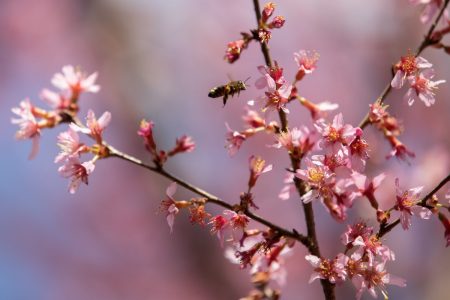Campus is buzzing following renewal of Bee Campus certification

A bee approaches blooming flowers in front of Leggett Building
Randolph College has once again received national recognition for its efforts to engage the campus in enhancing pollinator habitats both on campus and beyond. Bee City USA® has renewed Randolph’s Bee Campus USA certification for 2019 following a rigorous renewal application.
The Bee Campus USA designation recognizes educational campuses that commit to a set of practices that support pollinators, including bees, butterflies, birds, and bats, among thousands of other species. Randolph became the first college in Virginia to receive Bee Campus certification in 2016, and is only one of two schools in the state to hold the certification. The other is James Madison University.
As part of the re-certification process this year, Randolph’s Sustainability Council submitted a report on the College’s progress in improving the campus pollinator habitat. The report notes the College’s accomplishments in supporting pollinator habitats in the past year. One of those projects was when the College direct seeded a 1,000 square foot meadow in the Organic Garden with varieties of milkweed, bee balm, and nodding onion.
Bee City USA is an initiative of the Xerces Society for Invertebrate Conservation, the largest pollinator protection organization in the world. The Bee Campus USA certification program galvanizes campuses and communities to sustain pollinators by providing them with healthy habitat, rich in a variety of native plants and free to nearly free of pesticides. Imperiled pollinators like wild bees, honey bees, butterflies, moths, wasps, bats, hummingbirds, and others are responsible for the reproduction of nearly 90 percent of the world’s wild flowering plant species and one in every three bites of food we consume.
For more information about the Bee City USA organization, visit www.beecityusa.org.
Tags: Bee Campus USA, Bee City USA, bees, environmental sustainability, pollinators, sustainability, Sustainability Council
